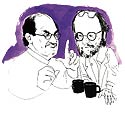
In Salman Rushdie’s fairy-tale-like novel Haroun and the Sea of Stories, a renowned tale-spinner is robbed of his skills, and his son goes on an elaborate trip to rescue his father’s inspiration. It was the first book Rushdie wrote in hiding, and it deals explicitly with the stifling of free expression. It’s full of color and life, perfect for the stage, but like its characters—and Rushdie himself—Charles Wuorinen’s opera based on the book has had a complex journey. Slated for a 2002 opening at the New York City Opera and bumped twice, it finally gets a world premiere this fall. Alicia Zuckerman spoke with Wuorinen and Rushdie.
The book is a children’s story on the surface but with underlying political themes. And it’s about a father who needs to be saved.
Salman Rushdie: Children always believe it’s their fault when something bad happens to their parents. And I thought, Well, here’s this child wanting to save his father—why not let him? I saw the story as being intended for my son at two different ages: That when he read it at age 11, he’d get an 11-year-old’s pleasure from it, and now—he’s 25—reading it again, he would understand resonances he wouldn’t have at 11.
Charles Wuorinen: I wanted to try to emulate the character of the book and have it both ways. I mean, in the world of serious music, there’s a very strong populist push these days, and that’s something that I want no part of, but that fact doesn’t need to get in the way of the pure entertainment.
S.R. It’s a strange book, Haroun. This was the one that came with the greatest fluency—it took me less than a year, and it’s now taken ten times that long to adapt, so you know this is a much larger achievement. Haroun seems to make people want to do things to it—a French puppet-show version, theater adaptations …
C.W. There’s a practical reason for that. Its brevity makes it a little bit more manageable. I mean, I have my eye on The Moor’s Last Sigh …
S.R. Yes, that would be a very long opera.
Does the work feel different to you after September 11?
C.W. Even though the piece was essentially finished by September 11, it makes my attitude towards it different. Before, for most of us, the threats that underlie the book were abstract. All of a sudden, we were brought into direct confrontation with the same enemy that Salman had had all these years.
S.R. Yeah, I have sometimes thought lately that what happened to me was a kind of small prologue, and now we’re facing the main event.
Is it by design that the opera is premiering just before the election?
C.W. If only that were true.
S.R. Us and Michael Moore—we’re the ones who are going to settle the swing votes. [They both laugh.]
Haroun and the Sea of Stories, New York City Opera; premieres October 31.